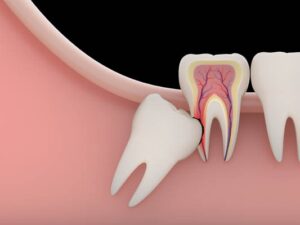Root canal. Medieval torture. Both phrases make even the bravest of us a little queasy, but root canals are actually legal. Our natural response to, “You need a root canal,” is, “Do I have to?”
If you have ever considered putting up with an aching tooth forever just to avoid a root canal, this article is for you. Stick around and find out if root canals are necessary or just one of Satan’s little amusements. We will also explore root canal procedure options.
What good can come of a root canal?
A root canal is needed if the pulp deep inside the tooth becomes infected because of an injury or untreated cavity. The infamous pain of a root canal is actually the pain that comes before the procedure takes place. A root canal allows the removal of the damaged part of the tooth (and thus, the pain) while keeping its outer structure. It is also a cheaper, shorter process compared to tooth extraction.
With proper care, the restored tooth can last a lifetime without further work.
How is a root canal done?
With modern methods, a root canal is relatively painless. The first thing the dentist does is numb the tooth with local anesthesia. The rest of the process goes like this:
- To keep the tooth clean and dry, the dentist isolates the tooth with a small sheet of rubber known as a dental dam
- With a small drill, the dentist opens the surface of the tooth to gain access to the infected inner tooth
- The dentist then removes the damaged and infected pulp and files down the insides of the tooth to accommodate the filling that will replace the removed pulp
- Next, the dentist cleans out the inside of the tooth with sterile water, removing any remaining pulp
- Finally, the dentist disinfects and dries the tooth and puts in a temporary filling
- After a few weeks, a permanent crown replacement is put in; if taken care of, the tooth will last a lifetime
What are the alternatives?
The best alternative is to make sure that one never needs a root canal. This means taking care of one’s teeth and wearing a mouth guard when playing contact sports. If prevention fails, other options are:
1. Tooth extraction and replacement
Another option is the removal of the entire tooth. After extraction, a dental implant can be put in. It may take more time and money than a root canal, but a dental implant encourages bone and tissue growth. Truthfully speaking, however, an extraction is a more uncomfortable procedure than a root canal.
2. Irrigation and disinfection of the pulp
Ozone gas can be used to irrigate the infected pulp. The gas reaches past the drilled area right into the little tubes that run from the enamel to the pulp. Ozone gas kills the bacteria in the pulp. However, there is no way of preventing future infection.
Calcium hydroxide is also used to irrigate the infected pulp. It kills the bacterial infection and dissolves any dead tissue in the tooth. Because it is toxic, calcium hydroxide is applied carefully with a syringe or small file.
Disinfection of the pulp is not widely considered as a long-term solution because re-infection could always happen. That said, it is the least invasive alternative there is.
Scientific advances in anesthesia and painkillers make a root canal quite painless. If you have a tooth that is infected, the best option is to have a permanent procedure done. Contact one of our dentists to learn more about root canals.
Let’s get started …
Go to https://brightsmileshallandale.com for more information about root canal alternatives or call Bright Smiles by Dr. Vera Family and Cosmetic Dentistry at (954) 456-1939.
Check out what others are saying about our dental services on Yelp: Root Canal in Hallandale Beach, FL.
Recent Posts
Indications For A Root Canal: What To Look Out For
A root canal is a procedure that dentists can perform to stop infection inside a tooth by removing its pulp, or the material in the center of a tooth. Since teeth are made of enamel and other hard materials, they do not swell up to warn you that an infection might be present, like other…
What Will Happen During A Root Canal Procedure?
A root canal procedure is a type of dental treatment in which they remove the infected or decayed pulp in the root of a tooth to prevent the spread of an infection and preserve the long-term health of the tooth. It is helpful to understand the process dentists use during a root canal procedure to…
What To Expect When Consulting A Restorative Dentist
A restorative dentist can bring back your smile and dental function. You should consult this dentist first before your treatments begin. That way, you will know what the procedures will entail. Here are some of the things to expect during your consultation with your dentist.Some restorative dental treatments are invasive. This may cause anxiety in…
Are Root Canals Recommended By A Restorative Dentist?
A restorative dentist might perform a root canal to save a tooth with a damaged pulp chamber. It is a beneficial treatment that can have therapeutic benefits. A tooth’s pulp chamber is the innermost layer that contains its nerve and blood vessels. It is sealed off from the rest of a tooth so bacteria and…
Hallandale Beach, FL 33009
Suggestions?






